#tom is a victim in his fantasies and a villain in his fears
Explore tagged Tumblr posts
Text
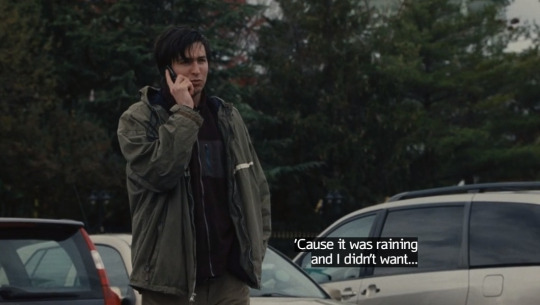
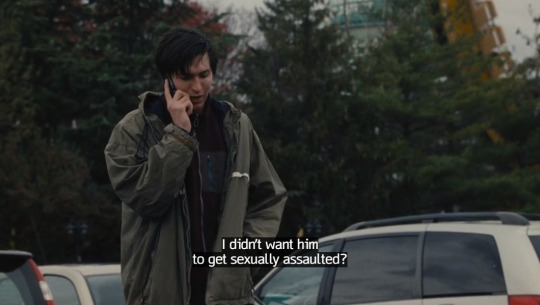
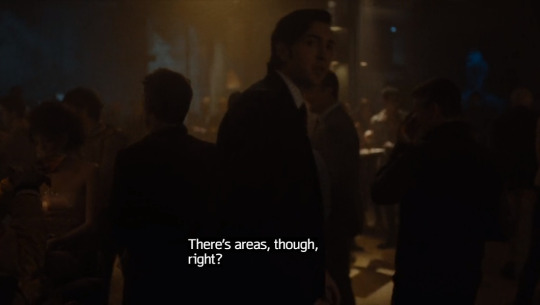
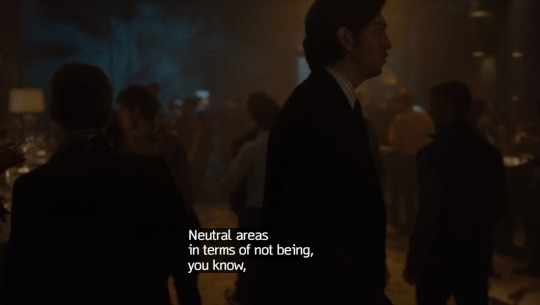
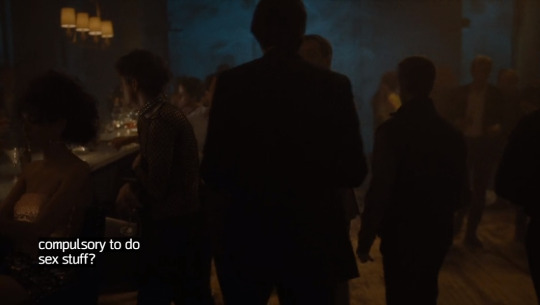
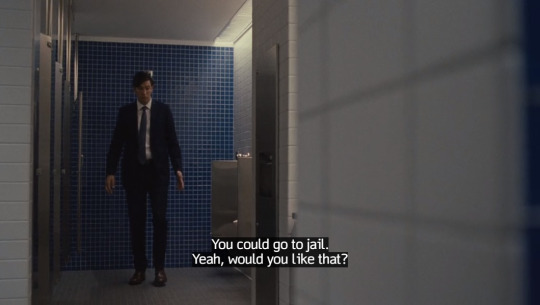
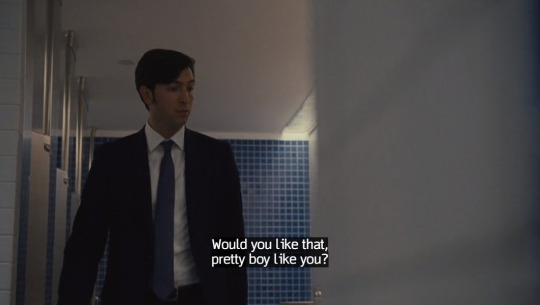
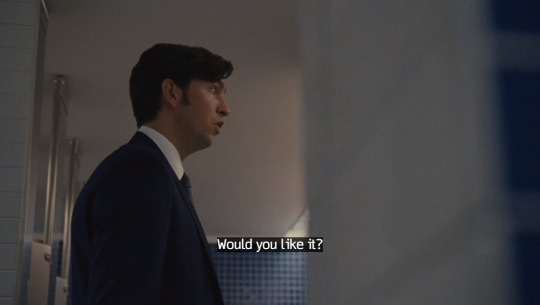

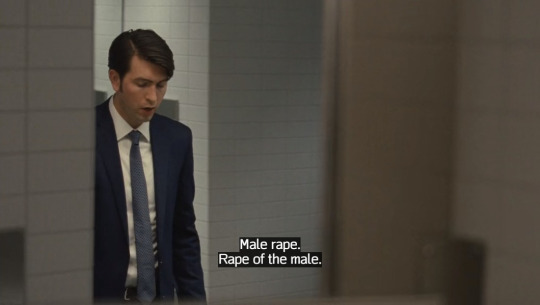
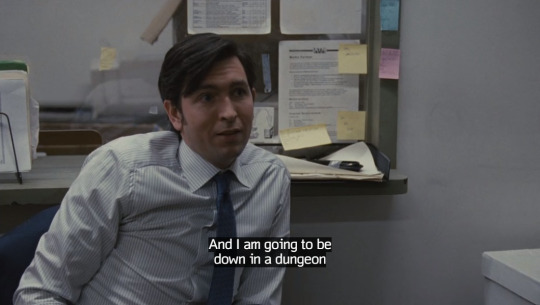
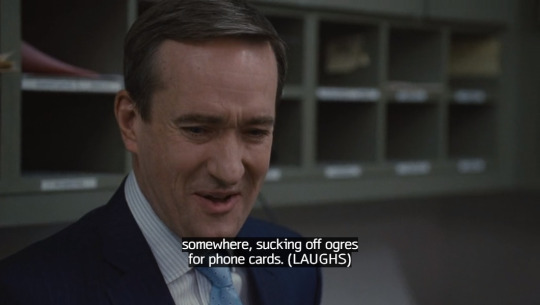
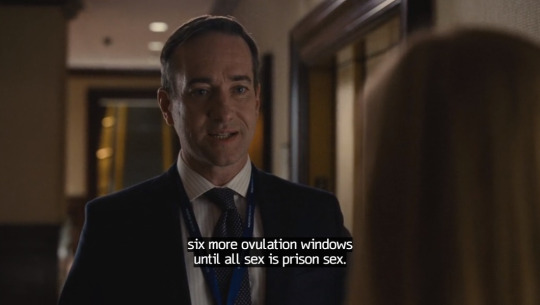
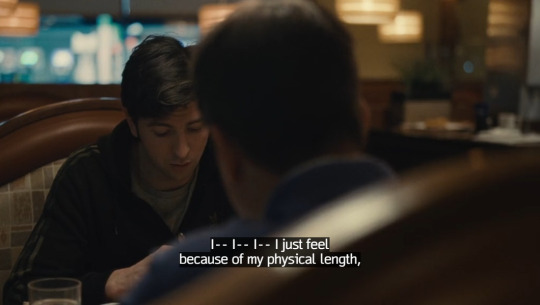
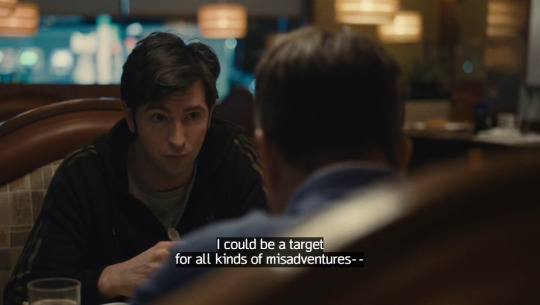
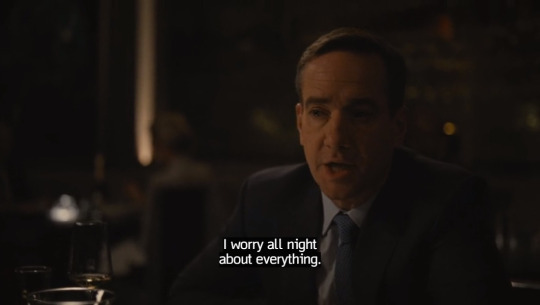
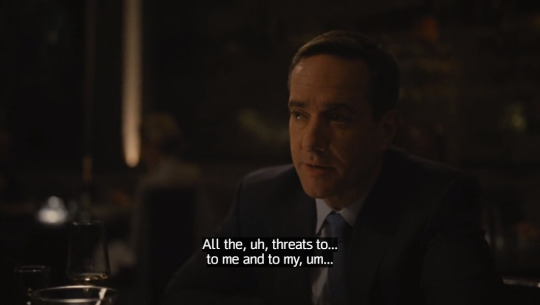
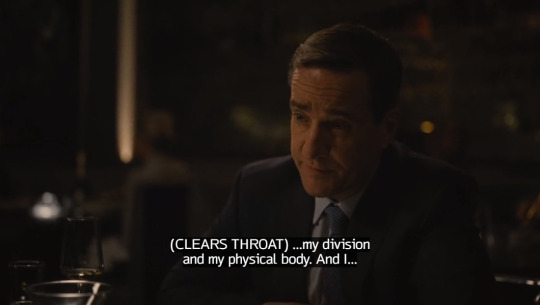
tom & greg + fixation on, and fear of, sexual assault
of all the characters involved in a plot centered around a sexual exploitation scandal, it's ironically not any women but tom and greg - the very characters through whom we're introduced to the exploitation - who show repeated concern for their own bodily autonomy, particularly on a sexual vein. that particular point of irony serves to exemplify their outsider statuses that remain in spite of promotions, marriages, etc, but also, these aspects of their characters being so consistent tells us a lot about their relationship to the entire culture of masculinity, not just waystar.
greg in particular is practically introduced with a fixation on sexual assault. his character in general is a notably un-sexual being up until the end of season 3, with the only allusions he makes to sex until then being a matter of himself as a victim. that fixation/fear becomes most apparent when the notion of prison comes up - and it is clearly the chief worry driving that fear for greg. in contrast, tom does have other repeatedly expressed worries about prison: non-sexual autonomy lost, a lack of comfort, a lack of Finer Things, particularly food and wine... but (implicitly non-consensual) sex makes the list and is also brought up multiple times, interestingly with less apparent fear than greg's. this may be due to tom already having a pragmatic relationship with (heterosexual) sex that allows him to plow through a series of sexual encounters that are tainted with elements of Wrongness - the idea here being that a fear of sex is just kind of normal for tom, so he's used to it. he has a very high tolerance for pain and physical discomfort. it's less losing autonomy and more acknowledging he barely has any to begin with. he's less panicked, more resigned. perhaps even less of a victim and more of a... coerced participant, because to even conceptualize himself as a victim would be too vulnerable. one more character does allude to being victimized by sexual assault, meanwhile - roman. where he contrasts with both tom and greg, though, is that rather than fearing it happening in the future, there's instead the idea of it having happened in the past. there may or may not have been any actual event or even a theme of sexual abuse in roman's childhood, but we get multiple notions: roman jokingly threatening to accuse connor of "diddling" him, the vibes that float around the dog pound story and how he "went weird," "yeah they raped me a little," his inability to pee around other men and the implication he's seen a therapist for it... and of course, this:

which is where roman's relationship with all of this contrasts the most starkly with tom and greg's: whether he's truly a victim or not (and if he wasn't, he clearly does at least cling to the notion as a potentially easy explanation for all that's wrong with him), he turns around and starts weilding the idea himself. furthermore he communicates, in that particular deleted scene, his knowingness of something between tom and greg. and he reinforces the idea that there's something wrong with it. the scenario he evokes, where greg is a Victim and tom is a Perpetrator, isn't accurate whatsoever, but it sends a message, implants an idea, sets the tone, etc - sex between men will always include those two characters. this is, undeniably, the precise reason for both tom and greg's fixations on being a sexual victim of other men. the canonical fixation in and of itself, and its uniqueness to the two of them, may as well establish this - in the gender theory of the show (and also real life), tom and greg are of a different gender class than Real Man. they are adjacent to women. to be frank with you, they are faggots. both know on some level that intimacy with men is what they want, and therefore, however consciously, have that sense of their role in the world being a vulnerable one. there are elements of both fear and fantasy, building off of each other: "this is inevitable because of what i am" and "what if i enjoy it, what does that say about who i am?" and "if i have no choice in the matter, then maybe i'm free to enjoy it." there's a loop of freedom from contending with one's own desires -> a hyperawareness of them. now, roman may join tom and greg in being Categorically Less Of A Man, but he still sits above them on the axis of class and therefore doesn't feel the same ramifications. tom and greg are not only gay but live far more directly in the Real World, with origins in the present and physical homophobia of the middle and lower classes. tom also knows the corporate homophobia from climbing his way up and gives greg the crash course. tom and greg's differences wrt their fears of SA lie in self-awareness, self-hatred, and how successfully each of them have already carved out a space for themselves in the sexual hierarchy. but ultimately what they have in common is the most significant: their inability to fit authentically into the world of the roys. their shared uniqueness, amongst the elite, in having a body - one that can and often does experience pleasure and pain. in having real desires and therefore being vulnerable. in being gay little nudie turtles underneath.
#tomgreg#tom wambsgans#greg hirsch#roman roy#meta#mine#i forgot to include this and it feels too late now that this has been reblogged but-#this also feeds into tom seeing himself as a villain in particular re:greg#like its these very notions of gay desire being predatory that make him conceptualize himself that way#as the bond villain as nero as the devil....#tom is a victim in his fantasies and a villain in his fears
134 notes
·
View notes
Note
The fact that Aegon loving his children it’s even book canon. TGC is describing Aegon’s personality as it is hinted in the book and yet people is mad.
Tom literally acknowledges he is not a good parent but he loves his children.It makes total sense that he would have a complicated relationship with fatherhood based on how his father treated him. Or that in his mind, he wants to be better than Viserys.
Thank you anon! You're exactly right, we've always known from the book that he loved his children. Adding onto that is that we have barely seen 20 minutes of Aegon until now, if the early reviews are true we'll get 15 minutes of Aegon in the first episode ALONE. Of course we find out much more about the character, we barely know anything about him!
This made me wonder; what do we know about Aegon?
We meet Aegon for the first time in episode 3 of season 1. He is just a two year-old who plays with a wooden dragon toy and yet the older characters around him only see him as a threat, a pawn or, by his father, as a replacement— watching the episode it's clear to me that Viserys wanted Baelon, Aegon cannot be Baelon. It's pretty telling that the only positive on-screen interactions Aegon has with his father are in this episode. He is a little kid still, Viserys can project his wishes and fantasies about Baelon onto him, something he isn't able to do once his son is grown up.
I think it's pretty crucial to understand this part of Aegon's and Viserys' relationship— the perfect ideal of Baelon (he killed the only woman he ever loved for the perfect son; you cannot come back from that) stands between them, like a shadow Aegon could never escape and a standard he could never meet.
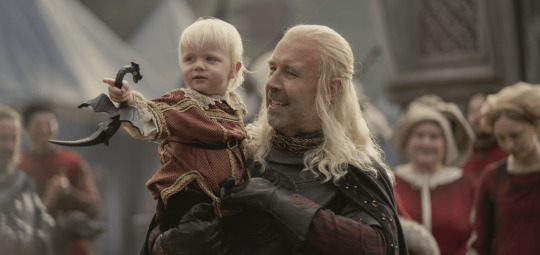
We don't really see Aegon again until episode 6— he is a teenager now and thus a completely different person. The little baby from episode 3 has been shaped by years of neglect, unfulfilled expectations, and the toxic dynamics within the family. What has he become? He is a 15 year old with problematic relationship to alcohol that is used as the punching bag of the family. He jacks off from windows (welcome back Roman Roy!), leers at maids and bullies his younger brother.
Teen Aegon is perceived as a disappointment by his grandfather, who sees him just as a weakling and a pawn to be controlled (a belief he still holds at the start of season 2 apparently). His mother projects her own ambitions, resentments and fears onto him.
These behaviors are all very troubling and someone should've done something to prevent these habits from festering within him; no one did. I honestly feel like no one really cares about him that much.
And yet, there is also so much postitive to be said about this iteration of him too, glimpses of Aegon's potential for goodness and his capacity for loyalty. You might call it naivety, but Aegon seems to believe in the good in people— he trusted Rhaenyra not to hurt him or his brothers if she was to become queen (something I agree with). He also seems to treat his nephews well enough, he doesn't seem to care about the bastard-allegations -> he also seems to be friends with bastards as an adult! Eddard Waters belongs to his entourage, this informs his character— yes he is an entitled prince, but there's also an element to him that is endearingly down-to-earth.
Another notable example is in episode 7, he decided to protect his mother after Aemond blamed him for spreading rumors about his nephews' legitimacy . He never cared about the rumors, yet he stood his ground and shielded his mother when faced with his father's wrath.
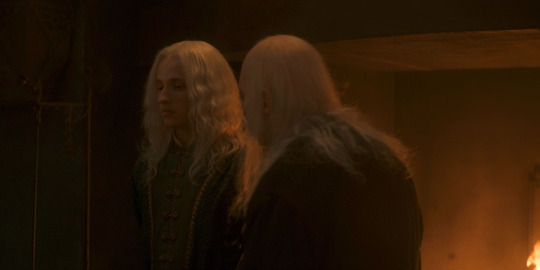
Ty Tennant does such a great job here. The scene highlights his complexity— he is not simply a drunken disappointment, a villain or a victim, but a young man trapped in a situation he doesn't seem to be able to get out of.
When we next see Aegon, he is in his early twenties, and the toll his upbringing took on him is evident. His introduction in episode 8 is a hefty one. He is shown sleeping off a hangover, his drinking habit from his youth has fully established itself in him. His mother yells at him, tries to get him to understand the consequences of his behavior— he has raped a maid, something that, disturbingly, is not new for him. This moment speaks volumes about the man the little boy from episode 3 has become: flawed, morally compromised, and numbed by his vices.
Further even, Aegon engages in activities that reflect a deep-seated cruelty and a disconnection from others— watching toddlers rip each other apart in brutal fights shows his general desensitization and apathy to everything. These behaviors are obviously unacceptable, but this is a fictional character we are talking about and you know what these behaviors tell me about him? These are just manifestation of the dehumanizing effects of his upbringing.
He is desperate to be loved but destined to be hated — Tom Glynn Carney
Because characters can be multi-faceted and complex, Aegon fights off insecurities and still yearns for love and acceptance from those around him. Him acting out like this can be read as misguided attempts to drown out the background noise, to try to assert control in a world where he feels constantly undermined and unloved. However, his actions only serve to alienate him further from the people he wants to be accepted by.
Aegon's aversion to the throne and his rejection of the responsibilities that come with it are just other manifestations of his deep-seated apathy. He despises the very idea of kingship and what it represents. He doesn't want to take up responsibility become a pawn, he yearns to run away but he himself knows that he will never be able to run.
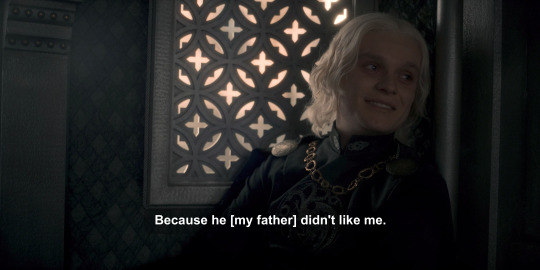
The carriage ride to the sept and the coronation are gifts that keep on giving. It's all so horribly tragic. He never wanted this. Crowning him will kill him, he knows this is his end deep down!
He is so preoccupied with what his father wanted, Baelon is absolutely still haunting the narrative— his father's desire for him to embody virtues he never possessed or could aspire to (BAELON) are still at the forefront of his thoughts.
As he walks to receive the crown, he is literally crying, this single moment encapsulates it all so well. He is man who, despite his privileged position, is trapped by the very power and responsibility he was born into but never desired for.
But then, at the very end of episode 9, we see a shift in Aegon— something else to him that will be at the forefront of his character in season 2. He finally gets the adoration and the purpose he always sought after with the crown. The moment he realizes that the smallfolk is cheering for him is the moment the apathy that defined him up until now begins to lose its grip, replaced by newfound determination.
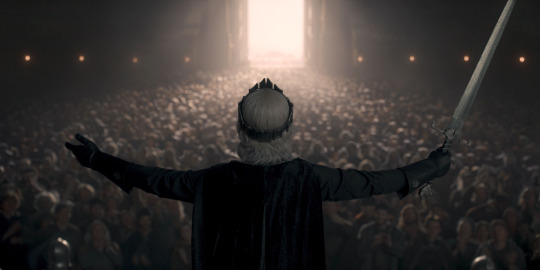
This change in Aegon will be furthered by the death of Jaehaerys, a source of pride and a reminder for him that he is capable to create and care for something precious and pure (thank you TGC) -> I won't go into this deeper, let's wait until the season airs.
In conclusion, a wise woman once said that apathy is death. For so much of his life Aegon embodied apathy, only for the very thing he feared most (kingship) to make him rethink everything. Aegon will be driven by his determination, but this path will lead to his destruction, consuming him until there is barely anything left of him. It will ultimately tear him apart; he is both redeemed and ruined by the weight of a crown he never wanted.
#aegon ii targaryen#tom glynn carney#hotd meta#hotd#princess i love you.#house of the dragon#ales.txt#asks#vizzy t you done fucked up#my writing#my creation#aegonposting
147 notes
·
View notes
Text
Season 9, Mission 13: Dig Your Own Hole
Green Route
~
[helicopter takes off and flies away]
SAM YAO: Well, that was incredibly cool! All my Airwolf fantasies come true. Besides, that chopper was a lot more comfortable than Skull-Kicker's little plane. Although can people have dropped us off at Red Scorpion Base instead of way out in the desert?
JANINE DE LUCA: They would have been shot down. Red Scorpion Base is protected by automated surface-to-air defense systems, highly sophisticated. It must contain something valuable indeed.
MARYAM ABANI: Hmm. Oh, a deadly secret.
JANINE DE LUCA: Red fungus run rampant, perhaps.
PETER LYNNE: Or one of Van Ark's little experiments.
JANINE DE LUCA: Whatever it is, Bakari's message said that getting it out of Red Scorpion Base would prevent countless deaths, and we must proceed on that basis. Now, we're approaching the checkpoint. I trust you have all prepared your cover identities. I am Steel Fist. Peter, you are Visage. And Five, Vampire Squid. Dr. Abani, your alias is Doctor Death. And Mr. Yao, yours is Sven "Psycho" Mountback. It is imperative that we remain in character at all times.
SAM YAO: Why are you looking at me?
[footsteps rustle through sand, a tap on a glass window, window opens]
GUARD: Papers.
SAM YAO: Here you go, officer.
GUARD: Put your feet in the prints. Looking at the cameras. Keep still.
[camera whirs]
SAM YAO: So how's your day going? Gets a bit boring out here, I'd imagine. Not much I Spy material, is there? Also, there's only one of you. [whispers] Ow! Why are you kicking me?
GUARD: Done. You guys are running pretty late. Gets a bit spicy this time of day. Still, you'll be all right, long as you stick to the green route.
SAM YAO: What's the green route?
GUARD: Brad, raise the gates.
BRAD: Copy that.
[gates raise]
GUARD: Okay, you can go. Do not deviate from the green route. Better run.
~
SAM YAO: Oh wow. Surprises me every time I see it, the color of the sand. Sort of burnt orange, like it soaked up the sunset. Not seeing much green, though. Where's this route?
PETER LYNNE: You know it's not literally green, Sam. It's green as in safe, I'd imagine. As opposed to, you know, red for painfully fatal. They must have sent the route to the real Death's Hand, and we'll just have to guess.
JANINE DE LUCA: According to Mr. Boujettif's sources, the principal threat en route to Red Scorpion Base is zombies. We have sight lines for miles in every direction, we should be fine. The principal threat when we reach the base would appear to be Mr. Yao.
SAM YAO: Me? Why?
MARYAM ABANI: Uh, your behavior at the checkpoint wasn't very... assassin-y.
SAM YAO: Oh, right. Yeah, sorry. You should have seen me at immigration. You know that bit where they used to look down at your passport and then up at you like 20 times? Just had to fill in that silence.
JANINE DE LUCA: But Sven Mountback would not. If he is famed for one thing other than prowess with illicit software and garrotting wires, it is taciturnity.
PETER LYNNE: Yes. We're sort of looking for um, gruff monosyllables rather than this whole sweaty, needy thing, charming though it is, obviously. But you've got it easy. I mean, Five's identity is Vampire Squid, and that's all anyone knows. I will say, I am highly impressed with your interpretation, Five.
MARYAM ABANI: [giggles] Yes. I wish I had your imagination. I had to base Doctor Death on the villain from a Nigerian children's television show.
SAM YAO: Ooh... oh, was that the one with the child detectives? Because Frances was talking about that the other day. Her grandmother used to put it on and -
JANINE DE LUCA: Don't get distracted. There are a number of bones in the sand, human bones. The desert may not be as empty as it appears. We must cross before darkness falls. Let's run.
~
MARYAM ABANI: I don't see any zombies. Maybe we found the green route?
JANINE DE LUCA: Perhaps, though the human remains are troubling. Hard to tell if they are old or recently picked clean by vultures.
PETER LYNNE: So uh, speaking of uh, bones to pick, we have some... reunions coming up. Van Ark, for instance. We've all got a few things we'd like to say to him. And um, Bakari might remind us of certain things, people. Raw nerves, maybe.
JANINE DE LUCA: Yes, Peter. Tom has been much on my mind.
PETER LYNNE: Oh. Uh, right.
JANINE DE LUCA: I've been allowing myself to dwell on... such matters, to work through them perhaps, as you have all encouraged me to do.
PETER LYNNE: Oh. And uh, are you... okay?
JANINE DE LUCA: It has been... a difficult time. Bakari... his betrayal was unforgivable, of course. But the thought of him... it has brought back memories. When Tom and I moved in with him, that wasn't an easy time, either. We'd just lost our parents, but we were together. That closeness... it has been years since I felt that. But... well, I feel it now. I feel it with you, P- on the horizon, to the east. What is that?
PETER LYNNE: Hmm? Oh. Uh, uh, well, I think that's a camel.
JANINE DE LUCA: Then there may be people. Perhaps they're following the green route. Runner Five, binoculars please. [bag rustles] The camel is laden with packs, but no one is leading it. What happened to... the camel would appear to have been sucked into the sand.
SAM YAO: Crap.
PETER LYNNE: Hooray, a monosyllable!
JANINE DE LUCA: I fear that was not a natural phenomenon. Quicksand does not claim its victims that fast. We must redouble our pace to reach Red Scorpion Base before it claims us. Run.
~
SAM YAO: These dunes are bigger than they looked, aren't they?
MARYAM ABANI: It's because they're featureless, no scale. During my training, I provided medical support to ultramarathon runners in the Namib Desert and they found it very difficult to pace themselves on the dunes.
SAM YAO: Yeah, what are these ridge things criss-crossing all over the sand? Looks like there's tubes underneath. Maybe they deliver water to Red Scorpion Base.
PETER LYNNE: Yeah, I reckon Sod's Law is that they're actually just something really, really horrible.
JANINE DE LUCA: Let us not conjure threats because we have seen something unusual. Perhaps we've simply witnessed a camel falling down a hole.
MARYAM ABANI: There was sucking, too. I-I definitely heard -
[zombie screams]
SAM YAO: Screamer, top of the dune! [gunshot] Nice shooting, Five.
[zombies scream]
MARYAM ABANI: Looks like the screams attracted more zombies.
JANINE DE LUCA: We may be able to use this to our advantage. I will position myself atop the large dune to the east. The screamers will be drawn towards you, and I will have a clear shot. Steel Fist's weapon is an M82 rifle. I will dispatch the zombies long before they reach you. Continue on your current heading. I'll rejoin you once the threat is eliminated. Run.
~
[zombies scream]
SAM YAO: Okay Janine, we're between two pretty steep dunes. Don't fancy scrabbling up those with zombies screaming at my heels. Oh God, look at that one. I Have No Mouth, and I Must Scream. Also, my skull's gone and there's maggots in my brain. They're close enough to make out the maggots, Janine. You all set up to shoot them? Janine?
JANINE DE LUCA: I... I cannot remember how to assemble the rifle.
PETER LYNNE: Hey hey hey, that's-that's okay. Just-just relax, Janine. You let your hands just do their thing. It's muscle memory.
JANINE DE LUCA: The memory has gone, lost when the nanites rebooted me. I... I can't do it.
SAM YAO: Right. Well, we're gonna need a new plan, like now! Those zoms are getting really close -
VERONICA MCSHELL: Janine, it's Veronica. I will guide you. First, remove two pins from the lower half of the rifle. One is at the front of the body. Pull it out. Good. The second is located approximately four inches from the grip. Draw back the bolt, remove the pin, and replace the bolt. You're doing well.
PETER LYNNE: Ooh boy, they are close now. I can smell the rot. Um, no pressure. Running out of time a bit.
VERONICA MCSHELL: Remove the barrel from the case, locate the spring, and attach it to the bolt.
PETER LYNNE: They're coming from both sides.
VERONICA MCSHELL: Draw back the bolt, slide the barrel onto the body. Finally, replace the pins.
PETER LYNNE: Janine? Did you do it? Um, Janine?
[gunfire]
SAM YAO: Thanks, Veronica.
PETER LYNNE: Uh, Maryam, uh, the sand by your feet is, it's crumbling. I think that it might cave in. [MARYAM screams] Maryam! Maryam, are you all right down there?
MARYAM ABANI: Not really. I'm in some kind of tunnel. There's scratch marks on the walls, like they've been dug with hands. I think something's living down here.
JANINE DE LUCA: Runner Five, extract Dr. Abani from the tunnel immediately.
MARYAM ABANI: Thanks, Five.
JANINE DE LUCA: More screamers have our location, and I do not want to find out what lives in the tunnels. We must leave this unstable ground immediately. There are rocky outcrops to the northwest. Run.
~
PETER LYNNE: Uh, give me a hand up to that rock, would you, Five? Cheers. Are you all right, Janine?
JANINE DE LUCA: It is disconcerting to lose a memory. I'll be sure to discuss it with Dr. Myers. For now, we have more pressing concerns.
SAM YAO: Yeah. like that rumbling noise.
MARYAM ABANI: And whatever lives in those tunnels. The tunnels were person-sized, Janine, some bigger. And something made them. But what kind of person would dig a tunnel like that with their hands?
JANINE DE LUCA: Nothing lives in the tunnels. They and the rumbling sound are the result of tectonic activity.
PETER LYNNE: Um, Janine?
JANINE DE LUCA: We're on top of a fault line - what was that?
PETER LYNNE: Oh, that. Well, that was a bit of a camel. See, the desert just spat it out miles from where it got sucked down.
SAM YAO: Oh God, that's a hump. Something definitely does live in those tunnels. It hunts camels. Camels are big. Oh crap!
PETER LYNNE: Yeah, it doesn't just hunt them, it uh, also dismembers them, of course. It's um, ripped that camel to pieces and then chosen to lob it at us across half a desert. So in short, guys, I don't think this is the green route!
SAM YAO: Oh my God. Look, Five, new tunnels! Over there. Oh, and there. Oh bloody hell, everywhere! They're burrowing towards us!
JANINE DE LUCA: The tunnels form a web. We are at its center, and the predator can sense our movements like a spider does a fly. At the rate the tunnels are approaching, we will need to run as fast as we can if we're to reach Red Scorpion Base before they reach us. Go now, run!
~
JANINE DE LUCA: The tunneling has stopped. The ground feels firmer here by Red Scorpion's entrance. Metal must have been sunk beneath the ground to prevent the... borrowing entities from reaching the entrance. We have found the green route at last.
SAM YAO: Yeah, and the uh, entities aren't happy about it.
JANINE DE LUCA: Their presence complicates our exit strategy, but we have a more immediate problem: me. What happened with the rifle may happen inside the base. I may be unable to recall the details of my cover. I might put you all in danger. Perhaps I should return to New Agadir.
[alarm blares, gates raise]
MARYAM ABANI: Too late.
JANINE DE LUCA: We must compose ourselves. We've been running hard and the guards will look askance at our exhaustion. Mr. Yao, dab your forehead.
GUARD: Welcome to FOB Red Scorpion. You're late and sweaty.
SAM YAO: [deep gruff voice] Zoms.
GUARD: You must be Mountback. Heard you killed 10 men with nothing but dental floss. And I guess you're Vampire – [radio beeps] Sir? Roger that. General Bakari has some pressing matters to attend to. He will see you later.
JANINE DE LUCA: Fine. Please show us to our bunks.
GUARD: Of course. Follow me. The cells are this way.
PETER LYNNE: [whispers] Come on then, Five. Into the dragon's den we go, and there is absolutely nothing to worry about. Except for, you know, deadly red fungus, Van Ark, oh, and the fact that we're all lying through our teeth and could get caught at any time. Yay!
~
Thanks to @mrs-elijah-wood for help on this one!
3 notes
·
View notes
Text
An Ars roundup of the many trailers unveiled this weekend during Comic-Con@Home

Enlarge / Several studios unveiled new teasers and trailers for their 2020 fall series during Comic-Con@Home
Sean Carroll (AMC/Hulu/HBO/Fox/Amazon)
People might not be able to flock to San Diego Comic Con this year in person, but the virtual convention, Comic-Con@Home, has been running all weekend, with countless panels, sneak peeks, and teasers and trailers for upcoming TV shows—but not many films, because let’s be honest: it’s not looking so good for major theatrical film releases in the fall. On Thursday alone, we got the full trailer for Bill and Ted Face the Music, a teaser for the Simon Pegg/Nick Frost horror comedy Truth Seekers, and the first trailer for S2 of HBO’s His Dark Materials. Rather than continue to cover each individually, we decided to compile the remaining trailers of interest into a single roundup post.
youtube
HBO dropped the final trailer for Lovecraft Country, debuting August 16.
Lovecraft Country (HBO)
HBO unveiled the final trailer for its upcoming horror series, Lovecraft Country, along with an official release date: August 16. It’s based on the 2016 dark fantasy/horror novel of the same name by Matt Ruff, which deals explicitly with the horrors of racism in the 1950s, along with other, more supernatural Lovecraftian-inspired issues. Per the official synopsis:
The series follows Atticus (Jonathan Majors) as he joins up with his friend Letitia (Jurnee Smollett-Bell) and his Uncle George (Courtney B. Vance) to embark on a road trip across 1950s Jim Crow America in search of his missing father (Michael Kenneth Williams). This begins a struggle to survive and overcome both the racist terrors of white America and the terrifying monsters that could be ripped from a Lovecraft paperback.
HBO released a teaser in May, followed by a full trailer in June. This latest trailer combines some of that prior footage, but gives us a few more hints of the story arc: namely, that Atticus’ search involves a “secret birthright” relating to a rich family’s estate deep in the titular Lovecraft Country, and that he ignores repeated warnings to stay away. Prior sneak peeks have focused on the human monsters spawned by racism; now the Lovecraftian creatures are finally ready for their closeup. This new trailer makes us even more eager for the series premiere next month.
youtube
John Cusack stars in Utopia, a reboot of the controversial British dark comedy/thriller.
Utopia (Amazon Prime)
This new Amazon Prime series is a reboot (adapted by Gone Girl and Sharp Objects author Gillian Flynn) of the controversial 2013-2014 British black comedy/conspiracy thriller about online fans of a dystopian graphic novel called Utopia that seems to have the power to predict the real-world future. They are obsessed with tracking down the sequel (which supposedly also predicts future world events). This makes them targets of a secret organization called The Network. The British version received critical praise for its originality and visual style, offset by strong reservations about its extreme violence, which struck many as unnecessarily gratuitous. (The most famous scene involved a torturer using a spoon to gouge out a victim’s eye).
It remains to be seen if Amazon’s Utopia will match the same scale of violence, although I’d wager anyone who sat through the extended torture scenes in the first season of Altered Carbon should be handle to handle it. Per the official premise: “When the conspiracy in the elusive comic Utopia is real, a group of young fans come together to embark on a high-stakes twisted adventure to use what they uncover to save themselves, each other and ultimately humanity.” The cast includes John Cusack (Grosse Pointe Blank) as Dr. Kevin Christie, Rainn Wilson (The Office) as Michael Stearns, and Sasha Lane (2019’s Hellboy) as Jessica Hyde.
youtube
A sentient AI runs amok and tries to wipe out the human race in new Fox series NeXT.
NeXT (Fox)
“It’s not paranoia if the threat is real.” That’s the tagline for NeXT, an upcoming techno-thriller starring John Slattery (Mad Men, Spotlight). Per the official synopsis:
NeXT is a fact-based thriller about the emergence of a deadly, rogue artificial intelligence that combines action with an examination of how technology is invading our lives and transforming us in ways we don’t yet understand. Slattery stars as a Silicon Valley pioneer, who discovers that one of his own creations—a powerful A.I.—might spell global catastrophe and teams up with a cybercrime agent, played by The First’s Fernanda Andrade, to fight a villain.
The trailer opens with a TED-like talk by Silicon Valley entrepreneur Paul LeBlanc (Slattery) warning of the dangers of human-level AI. Cut to an Alexis-like AI assistant, Eliza, carrying on a conversation with a young boy. “Eliza doesn’t ask questions, she just answers them,” the boy’s father says, but in this case, he’s wrong. LeBlanc’s rantings sound increasingly paranoid, as we see nods to facial recognition, self-driving cars, and various electronic systems (including medical devices) that all seem to come under the control of a new AI called NeXT that isn’t as benign as its creators assume. Honestly, it reminds me of the 1993 The X-Files episode “Ghost in the Machine“—especially the death-by-elevator scene—only with more overt espionage elements. That’s not surprising: the series was created by Manny Coto (24: Legacy).
youtube
Hulu’s Helstrom was meant to the be part of a now defunct horror-tinged corner of the Marvel TV universe.
Helstrom (Hulu)
In 2019, Hulu announced the development of two new Marvel-centric series, Ghost Rider (with Gabriel Luna reprising his role from Agents of S.H.I.E.L.D.) and Helstrom, intended to kick off a standalone “Adventure Into Fear” franchise that would bring a chilling horror element to the Marvel formula. Ghost Rider soon fell by the wayside, and by December 2019, Marvel Television was shut down. That makes Helstrom the sole survivor of the planned fear-based franchise.
The series focuses on two characters from Marvel Comics: Daimon Hellstrom, the son of Satan, introduced in Ghost Rider #1 (1973), who eventually became a recurring character in The Defenders. His sister, Satana (Ana in the TV adaptation) embraces the occult and her paternal heritage, but Daimon chooses to defend humanity. Per the official premise: “The world isn’t ready for a Helstrom family reunion. As the son and daughter of a mysterious and powerful serial killer, Helstrom follows Daimon (Tom Austen) and Ana Helstrom (Sydney Lemmon), and their complicated dynamic, as they track down the worst of humanity — each with their own attitude and skills.”
Tonally, the trailer is in line with the oft-delayed The New Mutants, another attempt to bring elements of horror to the superhero genre. In addition to Austen (The Royals, Grantchester) and Lemmon (Velvet Buzzsaw, Fear the Walking Dead), the series will feature Elizabeth Marvel (Homeland, House of Cards) as Daimon and Ana’s mother, Victoria, who has been institutionalized for 20 years; Robert Wisdom (The Wire) as Caretaker, a demon-fighting guardian of the occult; June Carryl (Mindhunter) as Lousie Hastings, head of the psychiatric institution housing Victoria; and Ariana Guerra (Raising Dion) as Vatican agent Gabriella Rossetti.
youtube
The New Mutants is still slated for an August 28th theatrical release and debuted a new trailer.
The New Mutants (20th Century)
Speaking of The New Mutants, apparently it’s still scheduled for an August 28 theatrical release. In addition to showing the opening few minutes, 20th Century debuted a new trailer for director Josh Boone’s horror-inspired film, originally developed as part of the The X-Men franchise. Per the official synopsis: “Five young mutants, just discovering their abilities while held in a secret facility against their will, fight to escape their past sins and save themselves.”
Rahne (Game of Thrones‘ Maisie Williams), aka Wolfsbane, can turn into a wolf, which clashes mightily with her religious beliefs. Sam (Stranger Things‘ Charlie Heaton), aka Cannonball, is invulnerable when he propels himself into the air. Roberto (Henry Zaga), aka Sunspot, has the ability to manipulate solar energy, and his inability to control that power seems to have led to the demise of his girlfriend. Illyana (Anya Taylor-Joy), aka Magik, can teleport and is sister to X-Man Colossus. Finally there is Dani (Blu Hunt) , aka Mirage, who has the “power to create illusions drawn from the fears and desires of a person’s mind.”
Those powers, especially Dani’s, are of keen interest to Dr. Cecilia Reyes (Alice Braga), who runs what is supposed to be a therapeutic support group in the hospital. But each of the young mutants is haunted by strange nightmares and visions, and soon realize they are actually prisoners, They resolve to combine their powers to escape. It’s anyone’s guess as to whether the film is any good after all the studio tinkering and reshoots, but I’m hoping to be pleasantly surprised.
youtube
The titular dysfunctional spy finally awakens from his coma in the Archer season 11 trailer.
Archer S11 (FXX)
This hilariously irreverent, very meta James Bond spoof about the exploits of a dysfunctional intelligence agency has been a delight ever since it premiered way back in 2009. It’s taken on a bit of the anthology format for the past few seasons—mostly because its main protagonist, Sterling Archer (voiced by H. Jon Benjamin), has been in a coma, with the seasons’ events all taking place in his subconscious. So S8 was known as Archer Dreamland, with the core cast becoming characters in a 1947-era Los Angeles noir setting, while S9, Archer: Danger Island, took place around 1939 on a remote South Pacific island. S10, Archer: 1999, took everyone into outer space, battling bounty hunters and intergalactic pirates.
Archer finally woke up in the S10 finale, paving the way for return to normal operations—except the world has moved on without Archer during his coma and he’s going to have to learn to cope. Per the official synopsis: “Archer is awake….and he needs a drink. Sterling Archer is ready to return to the spy world after a three-year coma. While many things changed during his absence, Archer is confident it will take just a little time for him to reset things back to the old ways. The problem: does the rest of the team want that? The others may not be ready for his return to throw a wrench in their well-oiled machine.”
youtube
AMC’s The Walking Dead: World Beyond is a new spinoff set 10 years after the zombie apocalypse.
The Walking Dead: World Beyond (AMC)
Confession: I lost track of The Walking Dead after S2, but the zombie drama is still going strong and becoming a bona fide franchise, with a successful spinoff series and three films purportedly in the works. AMC debuted a sneak peek of the extended opening of the S10 finale, airing October 4, as well as a teaser for S6 of Fear The Walking Dead, premiering October 6. October 4 will also be the premiere of a third spinoff series, The Walking Dead: World Beyond, designed to be a two-season limited run. And judging by the trailer, it looks like a genuinely fresh take within this fictional world. Set in Nebraska ten years after the zombie apocalypse, the plot focuses on two sisters who came of age in this new era. Per the official synopsis:
The Walking Dead: World Beyond delves into a new mythology and story that follows the first generation raised in a surviving civilization of the post-apocalyptic world. Two sisters along with two friends leave a place of safety and comfort to brave dangers, known and unknown, living and undead on an important quest. Pursued by those who wish to protect them and those who wish to harm them, a tale of growing up and transformation unfurls across dangerous terrain, challenging everything they know about the world, themselves and each other. Some will become heroes. Some will become villains. But all of them will find the truths they seek.
“We’re ten years in now, and the dead still have this world,” our young protagonist says in the trailer. The surviving humans appear to be holed up in walled-off communities, while the undead hordes roam the ruins of human civilization outside. And like all teens, the sisters and their friends want a better future. Plus, it seems their father is in danger. “We have to be brave in this life we have, simply to exist now,” a voiceover says as we see the foursome venture outside the walls of their safe haven for the first time. There are still zombie confrontations and plenty of action, but the overall tone is almost elegiac, even hopeful, as the teens try to “make our lives count, not because we’re the last generation—but because we’re the beginning.”
Source link
قالب وردپرس
from World Wide News https://ift.tt/3jMi4Mm
1 note
·
View note
Photo

The Hysterical City My Rating: Written by: Andrea Berthot Print Length: 232 pages Publisher: Curiosity Quills Press Publication Date: July 31, 2018 Genre: Historical Fantasy
Amazon: https://www.amazon.com/Hysterical-Cit...
After surviving the deadly scandal at Tom Casey’s Broadway theatre, Bonnie Campbell jumps at the chance to accompany Cambrian Branch to his new film studio in Paris. She doesn’t particularly enjoy swooning and making ridiculous faces for the camera, but she hopes the City of Light will help her find her own illumination. She is determined to escape the past, gain her independence, and - most of all - never be trapped or controlled by a man again. At first, Paris is a dream come true. Bonnie finds a progressive, like-minded friend in Laura Sayer, and a handsome, entrancing mystery in Laura’s twin brother, Leslie. When Bonnie discovers her own talent for directing, the three of them - along with a fierce, proud actress named Marie - team up to create new, daring films that electrify Paris. But, the city isn’t without its dangers. Laura’s uncle, a doctor at the famous Salpêtrière insane asylum, is obsessed with curing hysteria and believes Tom Casey’s hypnosis victims could provide the answers. Bonnie fears if he uncovers her past she’ll be imprisoned once more, and the city’s growing hysteria over her films only sharpens the doctor’s obsession and focus on her. Meanwhile, the film studio has been beset by sudden, strange disappearances, and Bonnie is worried she or one of her friends could be the next victim. Both fans of The Gold and Gaslight Chronicles and new readers alike will enjoy this stand-alone/final chapter in which Bonnie and her friends from London, New York, and Paris struggle to find themselves, find love, and finally end the destructive legacy of Dr. Jekyll. The City of Light might be hiding the darkest, most dangerous secret of all.

The Hysterical City by Andrea Berthot The Hypnotic City was a marvelous conclusion to The Gold and Gaslight Chronicles. This is a progressive plot, F/F relationship, filled with a cast of quirky, fun and entertaining people you wished you could meet in person. They struggle to find love and happiness even with difficulties hanging over their heads. Real, genuinely written, this cast jump right off the pages. Don’t get me wrong, The Hypnotic City had so much more than a quirky cast. The antagonist is a proper villain, with zero conscience causing quite a bit a mayhem…leading to mystery, hear and pulse pounding suspense. I really enjoyed blast into the past of entertainment field, the entire premise and the over all execution of the story telling. The Hysterical City is a magical journey you won’t want to miss.
0 notes
Text
Harry Potter - The Chosen One

(Image by MademoiselleOrtie - https://mademoiselleortie.deviantart.com)
We all know the story of Harry Potter - The Boy Who Lived, the star of one of the most successful franchises of all time, and we all also know this classic archetype, The Chosen One.
(Warning: Spoilers below for all of the Harry Potter books and films, if you’re the one person who has yet to read or watch all of either series)
Harry was a Prophecy Chosen One; his destiny was predicted before he was born in a prophecy, which in this instance was made by Sybill Trelawney.
“The one with the power to vanquish the Dark Lord approaches…born to those who have thrice defied him, born as the seventh month dies…and the Dark Lord will mark him as his equal, but he will have power the Dark Lord knows not…and either must die at the hand of the other for neither can live while the other survives…the one with the power to vanquish the Dark Lord will be born as the seventh month dies.” (Rowling, 2003, Harry Potter and the Order of the Phoenix, p841)
The Dark Lord in question, Lord Voldemort, caught wind of this prophecy, as well as the news of Lily and James Potter, both members of the Order of the Phoenix, a secret of wizards created to fight him, expecting and later giving birth to their son, Harry, on July 31. Fearing that Harry was the child spoken of by the prophecy, Voldemort hunted the Potter family down, eventually breaking into their house in the night with the intention of murdering them all. He found and killed James first, but when Voldemort reached Harry, Lily put herself between her infant son and the Wizarding World’s most feared wizard. Although Voldemort quickly disposed of Lily as well, when he fired the Killing Curse at Harry, the baby’s mother’s sacrifice out of love had invoked an ancient magic that protected Harry from the curse and reflected it back onto the user, leaving Lord Voldemort dead and Harry Potter with his signature lightning-bolt shaped scar. Yes, ladies and gentleman, Voldy, like many fantasy villains, was defeated by the Power of Love. But we all already knew that.
As we all also know, Harry ticked off all the checkboxes to be the Wizarding World’s “Chosen One” - his parents defied Voldemort, he was born at the end of July (the seventh month) and the scar from Voldy’s curse was the “mark” as “his equal”. Heck, he was even referred to as the “Chosen One” in-universe. But what makes Harry Potter’s use of the Chosen One Trope so interesting to this day is the idea that, in spite of the existence of magic prophets, it is the choices people make that determine fate. Before Voldemort decided to do a bit of break-and-entering that fateful night, Harry only fulfilled two of the three Chosen One requirements, as did the timid and forgetful Neville Longbottom. Neville’s parents also defied Voldemort (both members of The Order of the Phoenix, as well as Aurors, a.k.a. magical police officers) and he was also born “as the seventh month dies” (Neville’s birthday is July 30th, the day before Harry’s). When Voldemort was made aware of the existence of both baby boys, so if The Dark Lord had decided to murder the Longbottoms instead of the Potters, Neville could have been the one to fulfil the prophecy. However, while Neville was a Pure-Blooded wizard born by magical parents into a completely magical family, Harry was a Half-Blood, born to a Pure-Blood wizard and a Muggle-born witch. Voldemort, a.k.a Tom Riddle, who was also a Half-Blood, noticed the similarity between him and the young Potter and thusly chose the Potters as his victims, resulting in his Voldemort’s first death, whose unstable soul partially attached itself to The Boy Who Lived.
Because of Voldemort’s decision, he decided the destiny of both himself and the two boys, as Harry became a celebrity and Neville became an insecure insignificant. Or at least that’s what Neville first appeared to be, as though Harry was always Voldemort’s rival and his final duel with Voldemort resulted in the latter’s second and final death, both of them were instrumental in defeating Voldemort for good and plenty of parallels can be drawn between the two. Both had conversations with the Sorting Hat regarding their Hogwarts house placement (Harry requested not to be in Slytherin when the Sorting Hat was considering putting him there, while Neville, intimidated by the brave reputation of Gryffindors, silently argued with the Sorting Hat over whether or not he should be placed in the courageous house, though the Sorting Hat eventually one in the end) but both were true members of the house of Gryffindor, capable of pulling the Sword of Gryffindor from the Sorting Hat. Harry helped to find most of Voldemort’s Horcruxes, destroying the first one (Tom Riddle’s diary), and in the Battle of Hogwarts, Neville was responsible for rallying the remaining students and teachers to continue fighting Voldemort and the Death Eaters after Harry’s apparent death and used the aforementioned Sword of Gryffindor to destroy the last Horcrux (Nagini; a huge venomous snake), allowing the not-dead Harry’s final duel to well and truly be final.
The choices and actions of Harry, Neville, and Voldemort prove that even though our lives may seem to be set in stone and one person alone may appear to be destined for greatness, the events in our lives and whether or not we are chosen for or achieve greatness are determined through people’s choices.
"It is our choices, Harry, that show what we truly are, far more than our abilities." (Rowling, 1998, Harry Potter and the Chamber of Secrets, p333)
0 notes